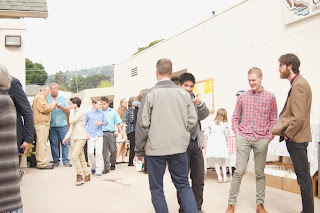How the Resurrection of Jesus Defeats Five Common Temptations In the Church (1/5)
2 Corinthians 3:18 - And we all, with unveiled face, beholding the glory of the Lord, are being transformed into the same image from one degree of glory to another. For this comes from the Lord who is the Spirit. (ESV)
Beholding is becoming. Or in Paul’s inspired words, “Beholding the glory...being transformed into the same image.” Listen to the communal language, “And we all.” Easter requires a week of weeks to even come close to beholding the glory of the risen Lord. It is a great season to ask, “what is the resurrected Lord transforming in the resurrection community as we behold him?” Here is the first of five common temptations in the church that the Lord is transforming.
Temptation One: The church as a historical society. (Memorialist/Cessationist)
Before Jesus showed up to the gathering of his friends, they were telling stories. The men didn’t believe the women’s story (Luke 24.10-11). Cleopas and his walking buddy were “talking with each other about all these things that had happened” (Luke 24.14). And when those two returned to Jerusalem they “told all that happened on the road” (Luke 24.35).
Stories and their stewardship are essential. Wakes have an important function. Getting together and recalling the old sayings and doings of our deceased family and friends can keep their memory alive. Wisdom can transferred. Laughter and tears can be therapeutic. Witness can be shared. The family of God has an important story to remember, but lest we forget, the one who was deceased is living and present when the family gathers in his name! Granted, it can be safer if you aren’t dealing with a living Lord.
There is a preaching temptation to talk about theological concepts or biblical principles or even Jesus stories. Proclaiming with a viva vox terrifies most preachers. But, if through the present ministry of the Spirit, Jesus is actually present in the community, how can we just talk about him. He wants to say something! “I love you.” “I forgive you.” “Given and shed for you.” “I baptize you.” “I choose you.” “You are mine.” “I will never leave you nor forsake you.” “I will change your name” “When you walk through the fire, I will be with you.”
There is a pneumatalogical temptation to relegate the gifts of the Spirit to another time and another place. Prophecy, use of tongues, prayers for healing and miracles in the hands of frail flesh can be a train wreck. So can sex and the Lord’s Supper and use of resources. Lets face it, we have a knack for misusing and abusing any gift. Cessationism is the belief that the age or dispensation for spiritual gifts has come to an end. I don’t want to craft a straw man, but most cessationists I know believe that the spiritual gifts were given for the historically short span between Pentecost and the time when the Scriptures were recognized as canon. The written word, they argue, fulfills the purpose that the gifts once served, so the gifts are no longer required.
Affirming the ongoing use of gifts in the resurrection community does not lessen the authority or sufficiency of the written word. When a guest heard tongues in a public gathering at Trinity one Sunday, and then the waiting for the interpretation, and then the spoken interpretation, he pulled me aside and said, “Was that..er..um...glossalalia?” Hesitantly, I replied, “Yes, that was glossalalia or speaking in tongues with interpretation.” “Oh, that’s what I thought.” He said, “It all seemed so...so...biblical!” Yes! That is why we are open to it. As we say, “Its in the book!” The risen Lord does not have duct tape over his mouth, but is always speaking his word, and bringing a timely application, and correcting abuses, and renewing where there has been disuse, and directing where there has been misuse. In 1 Corinithians 14, Paul talks about improper use of tongues and prophecy in the public gathering causing confusion and judgement. But the proper use will cause guests, “to fall on his face, he will worship God and declare that God is really among you.” Oh, that the church would be open to the proper use of resurrected Lord’s gifts poured out on her by the Holy Spirit.
There is a form of cessationism in the observance of the Lord’s Supper as well. This is eating and drinking in remembrance of historical redemptive events that happened long ago. So, how do historical redemptive events reach people alive today who need redemption. Does it happen in their memory or in their logic?
The “do this in remembrance of me” is not so much a trip down memory lane as it is bringing into the present what happened in the past. The crucified and risen One, living and breathing, bringing to bear all the historical redemptive acts to us now. “The cup of blessing that we bless, is it not a participation in the blood of Christ? The bread that we break, is it not a participation in the body of Christ?” (1 Corinthians 10.16). The presbyter standing at the altar is not speaking his own words or made up verba, but is proclaiming what the risen Lord is saying, “Take and eat, this is my body...”
In these three ways (kerygmatic, charismatic, and eucharistic), the resurrection community is more than a historical society, but a community of the risen Lord.



Comments